Faculty & Staff Physicians
For a list of all our cardiology faculty, please click here.
Faculty Spotlights

Anju Bhardwaj, MD
Dr. Bhardwaj is an Assistant Professor at UTHealth Houston, specializes in Advanced Heart Failure, and an Associate Program Director in the Cardiovascular Disease Fellowship.
Follow on X:  @docbhardwaj
@docbhardwaj
Where did you grow up? India
Why did you go into cardiology? Since childhood, I aspired to be a cardiac surgeon, inspired by my family’s influence. However, during my second year of medical school, I began to gravitate toward internal medicine. An elective in cardiology with a leading cardiologist in India solidified my path—at that moment, I knew cardiology was my true calling.
Tell us about the Advanced Heart Failure (AHF) group and what the fellows get to see while on the rotation. Our AHF program includes a combination of interventional heart failure and advanced heart failure physicians, so our fellows get a well-rounded approach.
- Our program is the only adult center in Houston to be recognized by ELSO as a platinum-level center of excellence, reflecting our commitment to high quality care in extracorporeal life support. As a high-volume shock center, our fellows gain extensive hands-on experience in cardiogenic shock, mechanical circulatory support, and cardiology critical care in our dedicated ICU.
- We perform more than 40 LVAD implantations each year, with 5-year survival exceeding the national average. This provides robust training in comprehensive LVAD management, including pre-operative evaluation, peri-operative support, and long term post-implant care.
- Our solid transplant volume ensures strong exposure to heart transplants, allowing fellows to develop competence in the full spectrum of peri- and post-transplant care through their training.
What do you see are some strengths of the fellowship program?
- Our faculty has a unique blend of interventional heart failure and advanced heart failure physicians, offering trainees a rich, multidimensional learning environment.
- Structured education for fellows, including weekly didactic sessions and personalized one-on-one teaching during their rotations.
- Emphasis on hands-on hemodynamics teaching in the cardiac catheterization lab, ICU, and during dedicated sessions.
- Given our vast referral base, fellows are exposed to a wide spectrum of complex cardiovascular pathology.
- We offer dedicated programs in pulmonary hypertension, Cardiac amyloidosis, HCM and cardiac sarcoidosis program.
- Annual Houston Shock Symposium dedicated shock conference hosted by our program, providing fellows with valuable opportunities to present cases, engage in academic discussions, and gain visibility within the broader institutional community.
- Robust structural heart disease program
- Growing emphasis on research, with increasing opportunities for scholarly activity, including clinical trials, outcomes research, and collaborative projects
What do you like or favorite things to do in Houston? Houston’s rich multicultural environment allows me to explore a wide variety of global cuisines, which I truly enjoy. As someone who loves to travel, I also appreciate the city’s excellent connectivity to both national and international destinations.
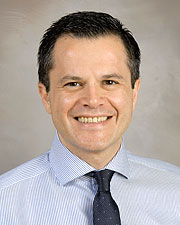
Konstantinos Charitakis, MD
Dr. Charitakis is an Associate Professor at UTHealth Houston, specializes in Interventional Cardiology, and an Associate Program Director in the Cardiovascular Disease Fellowship.
Follow on LinkedIn:  @Charitakis
@Charitakis
Where did you grow up? I was born in Athens and raised on the beautiful island of Crete, Greece — a place that shaped my love for life, community, and adventure.
Why Cardiology? Cardiology hooked me because it’s a true “start-to-finish” specialty: you diagnose with your clinical instincts, confirm with imaging, and treat with your hands. It’s an incredible mix of science, skill, and immediate impact.
What’s happening at the cardiac catheterization lab at Memorial Hermann Hospital-TMC? Our cath lab is a busy hub for coronary, peripheral, and structural heart procedures — both inpatient and outpatient. Fellows dive into everything from decision-making before the case, to performing hemodynamic assessments, biopsies in heart transplant patients, and operating a wide range of mechanical circulatory support devices. It’s a place where skills sharpen fast and confidence grows even faster.
What makes the fellowship program stand out? Without a doubt, Claudette — our amazing program manager — is the heart and soul of the program. And, of course, our faculty bring passion, experience, and an open-door spirit to teaching the next generation.
Favorite things about Houston? Crawfish season (mandatory), a perfect steak, long walks at Memorial Park with my dog, and Houston’s version of “winter” — where 65 degrees feels like a cold front!
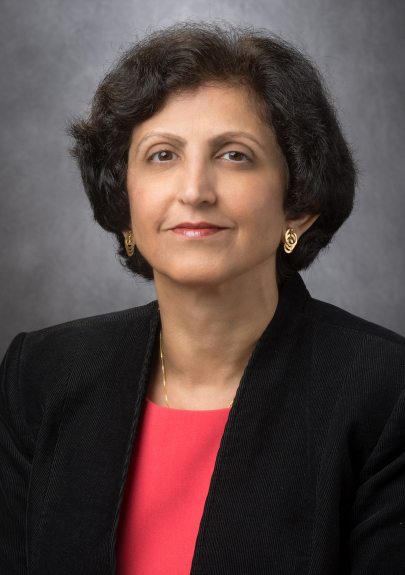
Anita Deswal, MD
Dr. Deswal is a Professor of Medicine and is the Chair of Cardiology at MD Anderson Cancer Center.
Follow on X:  @anita_deswal
@anita_deswal
Where did you grow up? I grew up in New Delhi, India. I was fortunate to have my medical school and internal medicine training at All India Institute of Medical Sciences (AIIMS), one of the premier medical schools in India.
Why did you go into cardiology? During medical school and residency, I was inspired by the amazing cardiology faculty in cardiology. They were outstanding clinicians, outstanding teachers in physical examination and patient management, and at the top of their field as academicians. They were the role models I wanted to emulate. Also, there was so much one could do in cardiology to help patients feel better. I think these were some of the reasons I made up my mind very early on to be a cardiologist. Over the years, cardiology has led the field in the rapid development of evidence based medicine by leading numerous clinical trials, making it a very exciting field to practice in.
Tell us more about the Cardiology department at MD Anderson: The formal Department of Cardiology was established at MD Anderson in 2000, becoming the first cardio-oncology department in the world. We are also the first cancer hospital to have a cardiac catheterization laboratory on site. The practice of cardio-oncology has truly evolved here over the years. The Department has grown to now include 16 clinical faculty and 2 basic science faculty. The Department of Cardiology at MD Anderson epitomizes the strengths of the Texas Medical Center in caring for patients with heart disease and cancer at the #1 cancer center in the world. We provide comprehensive cardiac care to patients who have co-existing heart disease and cancer and have specialized expertise in preventing and treating cardiovascular complications of cancer and cancer therapies, with an aim to limit interruptions in cancer therapy. We are also excited with our growing cardio-oncology research and educational programs.
What do you see are some strengths of the fellowship program? The different training sites provide a broad clinical training experience caring for diverse patient populations. MD Anderson provides learning opportunities in cardio-oncology, a relatively newer but rapidly growing field in cardiology. With increasing numbers of cancer survivors, cardiologists in all practice settings must provide care for this unique group of patients.
What do you like or favorite things to do in Houston? Houston is a very cosmopolitan city which is welcoming to people of all backgrounds. Here, one can enjoy cuisine from almost any corner of the world.
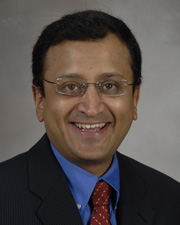
Siddharth Mukerji, MD
Dr. Mukerji is an Associate Professor at UTHealth Houston and specializes in Electrophysiology
Where did you grow up? I was born and raised in Mumbai, India.
Why did you go into cardiology? I believe that my calling was always Electrophysiology. I have always been fascinated by electrocardiograms and the stories they tell, whether it’s acute coronary syndrome from a right coronary artery versus left circumflex artery lesion, or tachycardia due to atriofascicular pathways. I started with this early in my internal medicine residency and going into cardiology was a no-brainer for me.
Tell us more about the Electrophysiology (EP) program and what the fellows get to see? We offer a diverse and complex array of EP pathologies. There is exposure to a wide range of procedures, including ablations, lead extractions, and device implantations such as left atrial appendage occluders and leadless pacemakers. Our program is highly hands-on, with active trainee involvement to ensure the strong competencies in the management of EP-related conditions.
What do you see are some strengths of the fellowship program? Clinical complexity, volume and vast variety of physicians trained from across the country sharing their experience, skills, and knowledge.
What do you like or favorite things to do in Houston? I am a foodie. I love to explore different eateries and try exotic foods. Houston has one of the best food scenes in the country. I also like the outdoors and enjoy hiking and biking on multiple trails in and around Houston.
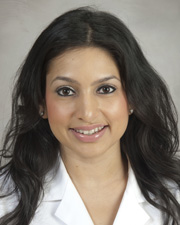
Monica Patel, MD
Dr. Patel is a Professor at UTHealth Houston with a specialty in PET imaging and is Program Director for the general cardiology fellowship
About Dr Patel and the Weatherhead Cardiac PET Center: Dr. Monica Patel is a quadruple board-certified cardiologist who has spent her entire career serving the Houston community. After receiving her Bachelor of Science in Biology and Chemistry in 1999 at Houston Baptist University as an Endowed Academic Scholar, Dr. Patel attended medical school at University of Texas Medical Branch in Galveston in 2003. She completed her Internal Medicine residency and Cardiology Fellowship at the McGovern Medical school at UTHealth Houston. She is board certified in Internal Medicine, Cardiology, Echocardiography, and Nuclear Cardiology.
Dr. Patel treats patients in her role as a cardiologist at Memorial Hermann Hospital in the Texas Medical Center and Lyndon B. Johnson Hospital. She has pursued academic medicine since 2010 at the McGovern Medical school. She is a professor who is also the co-program director of the cardiology fellowship. Her primary focus is prevention of cardiovascular disease and advanced cardiovascular imaging, including echocardiography, vascular imaging, nuclear imaging, and cardiac PET scans.
In June 2012, she joined the PET center as a co-investigator of the CENTURY Health study (over 1000 participants) at the Weatherhead PET (positron emission tomography) center, which aims at the prevention and reversal of coronary heart disease by intense combined pharmacologic and lifestyle treatment. The study involves multiple cardiac PET scans on each participant (at 0, 2, 5,and 10 years), and Dr. Patel evaluates how their lifestyle changes and medical treatment are impacting blood flow in their heart.
The Weatherhead PET center is also sought out by cardiologists for a second opinion on patients with complex coronary anatomy through the comprehensive utilization and interpretation of coronary blood flow on cardiac PET scans.
What do you see are some strengths of the fellowship program? 24% of our cardiology faculty are women, with many women in leadership roles. We have a high clinical volume and well-trained cardiology faculty, all with their own niche in the largest medical center in the world.
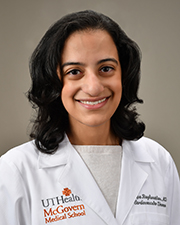
Deepa Raghunathan, MD
Dr. Raghunathan is an Assistant Professor at UTHealth Houston, specializes in structural imaging, an Associate Program Director in the Cardiovascular Disease Fellowship, and co-Program Director of the Cardiovascular Disease Innovations Fellowship.
Follow on X:  @DrDeepa1020
@DrDeepa1020
Where did you grow up? I grew up in Dallas, TX and have been in Houston and UTHealth Houston since my Cardiovascular Disease Fellowship
Tell us more about Structural Program at UTHealth Houston? The Structural Program at UTH is growing rapidly. We perform many transcatheter aortic valve replacements and edge-to-edge repairs of the mitral and tricuspid valves. We also perform left atrial appendage and interatrial/interventricular closure devices and septal coiling procedures. We are constantly enrolling and participate in several clinical trials as well. Given the growth of these interventional procedures, we are growing our structural imaging group as well. We provide procedural guidance in the cardiac catheterization lab at the time of implant, pre-procedural assessment to determine suitability of these percutaneous interventions and serial post-procedural evaluation.
What do you see are some strengths of the fellowship program? I feel this program prepares you to practice independently. By the end of your training, you feel comfortable managing common outpatient problems as well as very complex inpatients as well.
What do you like or favorite things to do in Houston? I love Houston! As someone from Dallas who grew up thinking I’d never like Houston, I have to say I’m pleasantly surprised. There are so many different cuisines and ways to explore the diversity that makes up Houston. We love our sports teams as well!
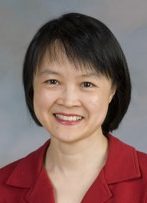
Poyee Tung, MD
Dr Tung is a Professor and Medical Director for the Adult Congenital Heart Disease Program at UTHealth Houston.
Where did you grow up? Hong Kong and Hawaii
Why did you go into Cardiology? There are so many good things about the field of Cardiology. It offers opportunities to take care of complex patients both in the hospital and outpatient settings. There are always new innovative treatment options and advances in a dynamic, ever changing field. You will never get bored doing it everyday!
Tell us more about the Adult Congenital Heart Disease program. Our Adult Congenital Heart Disease program is one of 55 ACHA accredited programs in the nation. We have the unique advantage of working closely with the pediatric group in taking care of these patients from birth until adulthood. In addition, we have the opportunity to collaborate with many of our excellent colleagues in maternal fetal medicine, pediatric cardiology, and other subspecialties in internal medicine and pediatrics. This is a very complex patient population, and taking care of them requires close collaboration from different disciplines.
What are the strengths of the fellowship program? There are many:
- Exposure to many different disciplines in Cardiology: structural heart interventions, complex electrophysiology procedures, end-staged heart failure and transplant patients for instance.
- Opportunity to work with some wonderful people, with colleagues who are good at what they do and really care about their patients
- We have a dynamic group of fellows and attendings, from all parts of the world. UTHealth Houston is comparable to the United Nations at its finest representation